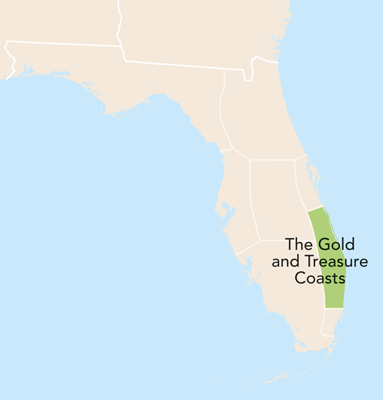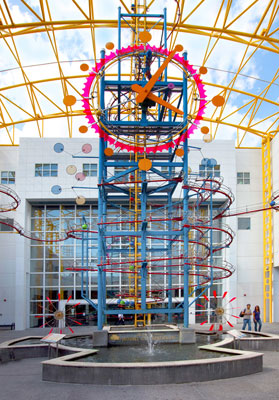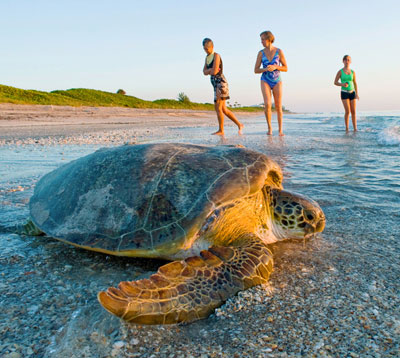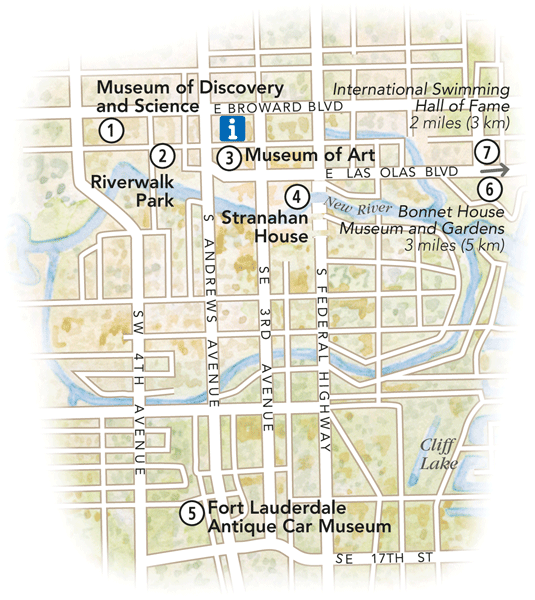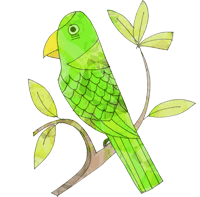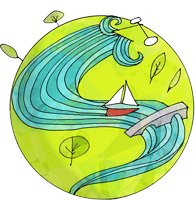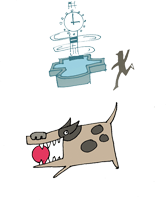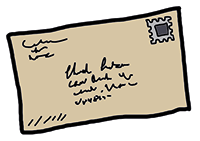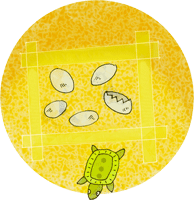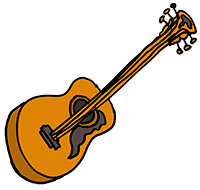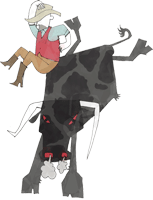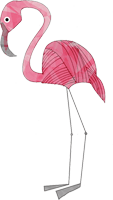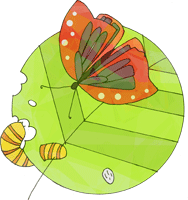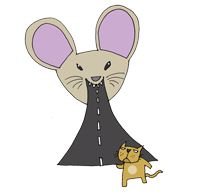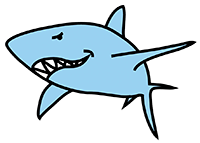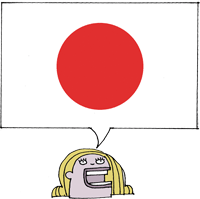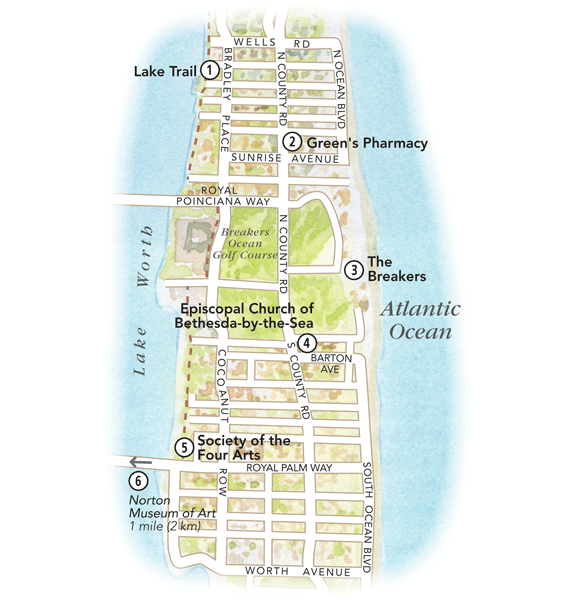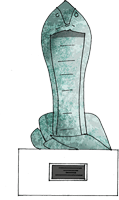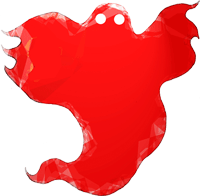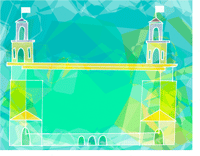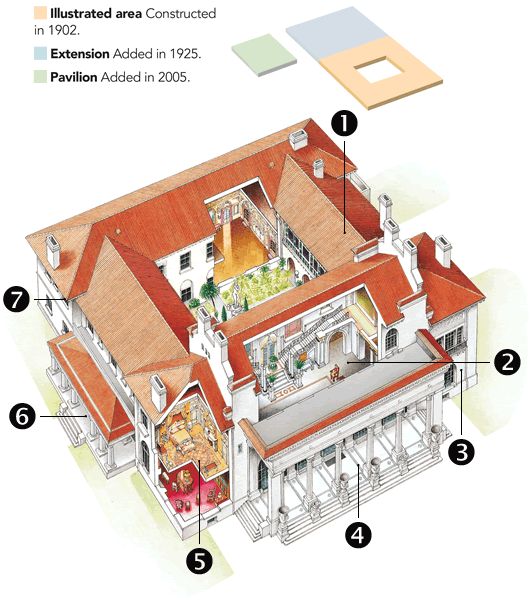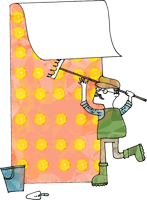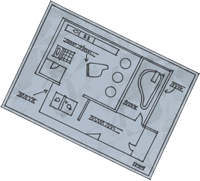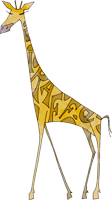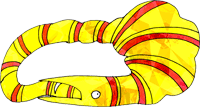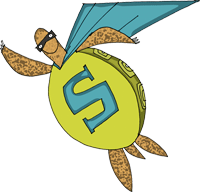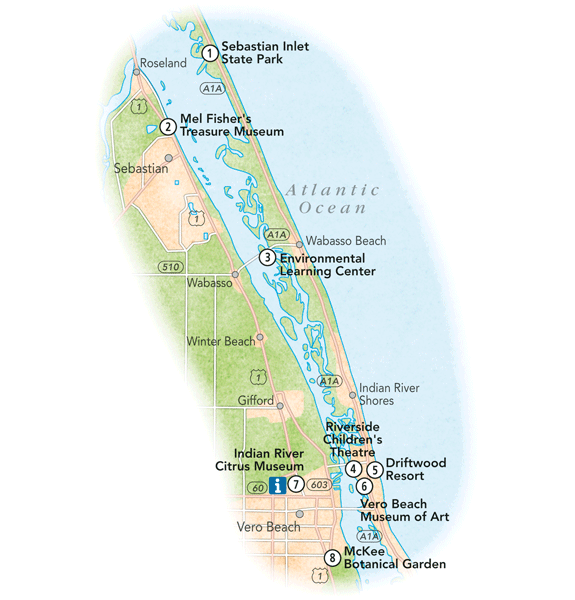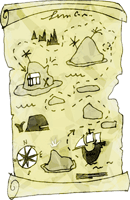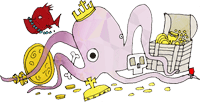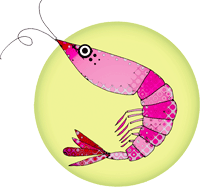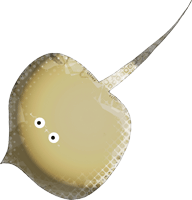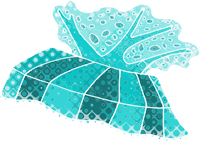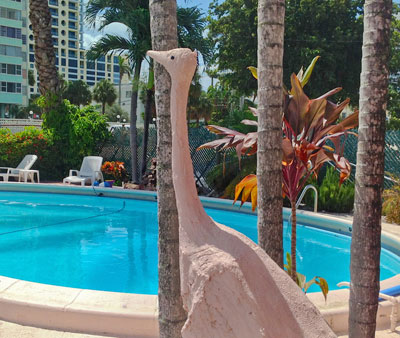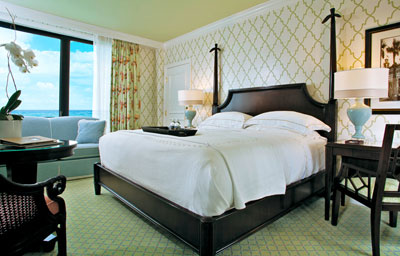< The Gold and Treasure
Coasts
The Gold and Treasure Coasts
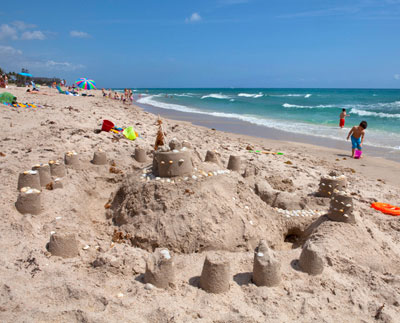
Sand castle at a public beach, Palm Beach
Running along Florida’s Atlantic seaboard, the Gold
and Treasure Coasts extend for some 200 miles (322 km) from Miami to the
Space Coast and the Northeast. The area is battered by tropical storms
in summer, but the weather is subtropical, balmy, and hot most of the
year. The beaches are superb. The coastline is heavily built up as far
as Palm Beach, trailing off into sparsely populated barrier islands,
swamp, and pine forest farther north. Separated from the barrier islands
and beaches by the Intracoastal Waterway, the mainland is dotted with
mansions and is rich in marine and bird life. Roads are great in this
region, but public transportation is limited north of West Palm Beach.
1. Fort Lauderdale
2. Hugh Taylor
Birch State Park
3. John U. Lloyd
Beach State Park
4. Seminole Indian
Hard Rock Hotel and Casino
5. Davie
6. Flamingo Gardens
7. Butterfly World
8. Boca Raton
9. Delray Beach
10. Morikami
Museum and Japanese Gardens
11. Palm Beach
12. Flagler Museum
13. Palm Beach Zoo
14. Lion Country
Safari
15. Juno Beach:
Loggerhead Marinelife Center
16. Vero Beach
17. Fort Pierce
18. Hutchinson
Island
19. Jupiter
Island
< The Gold and Treasure
Coasts
1. Fort Lauderdale
Beaches, vintage cars, and a rocket into
space
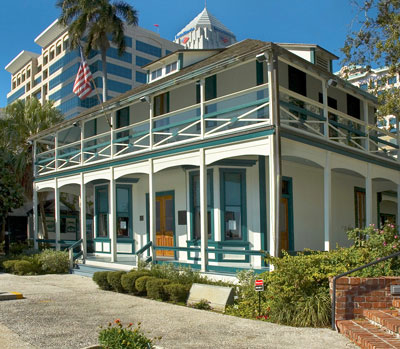
Stranahan House
Little more than a riverside trading camp in 1900,
Fort Lauderdale became known as “the Venice of America” when its
mangrove swamps were transformed into canals during the 1920s.
Today, water taxis and an old-fashioned riverboat, the Jungle
Queen, glide along these mansion-lined waterways, connecting
downtown with a stunning beach. The city is crammed with creaky old
houses to explore, hands-on art galleries, and an excellent science
museum.
Key Sights
1. Museum of Discovery and Science
Become an astronaut and travel to Mars, dig for fossils
alongside a megalodon shark, or watch a 3-D IMAX® movie at this
entertaining museum.
2. Riverwalk Park Running along the
banks of the New River, this shaded waterside park has winding
walkways that take in all sorts of shops and cafés.
3. NSU Art Museum Core exhibits here
include the vivid Impressionism of American artist William
Glackens, contemporary Cuban art, and the amazing Indigo Room
installation by Haitian artist Edouard Duval-Carrié, with its
themes of voodoo and migration.
4. Stranahan House Built in 1901, this
creaky pinewood home served as a trading post where pioneer
Frank Stranahan would buy goods such as egret plumes and
alligator hides from the local Seminole Indians.
5. Fort Lauderdale Antique Car Museum
The 22 vintage cars at this museum, which date from 1909 to the
1940s, keep alive the spirit of the Packard automobiles that
were once made in Detroit, Michigan.
6. Bonnet House Museum and Gardens
Explore the lush gardens of this Caribbean-style plantation
house, designed by painter Frederic Clay Bartlett in 1920.
7. International Swimming Hall of Fame
This museum is packed with swimming memorabilia, including
exhibits relating to Olympic legend Mark Spitz, and the history
of water polo.

Left Intricately carved door at
Bonnet House Middle Riverwalk Park
Right Museum of Discovery and Science
Kids’ Corner
Creature quest
There are many animals hiding among the
ponds, palms, and gardens of Bonnet House. See if you can
spot any of these creatures:
Amazon parrot
Cockatiel
Swan
Squirrel monkey
Gopher tortoise
Manatee
Venice in America?
Venice is a famous city in Italy. Why do
you think Fort Lauderdale is called “the Venice of America”?
The old new river
Is Fort Lauderdale’s New River really
“new”? Not really – the river was given its name by the
Spanish in the 1600s, possibly as the result of a legend
that claimed the river had miraculously sprung into
existence overnight. The river has actually been here for
thousands of years.
“Count” time on the great gravity clock
The giant clock in the Museum of Discovery
and Science is 52 ft (16 m) tall. Unlike a regular clock, it
has no hands: you tell the time by counting how many balls
are on the lower rails:
Each ball on the bottom
rail counts as 1 hour.
Each ball on the middle
rail counts as 10 minutes.
Each ball on the top rail
counts as 1 minute. What time is it now?
< The Gold and Treasure
Coasts
2. Hugh Taylor Birch State Park
Canoes, hikes, and bikes
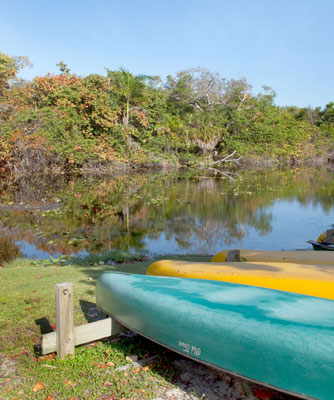
Canoes for hire at Lake Helen in Hugh Taylor Birch
State Park
This rustic park, just minutes away from downtown Fort
Lauderdale, preserves a pristine slice of Florida’s wilderness, thanks
to Chicago attorney Hugh Taylor Birch, who donated his estate as a
public park in 1941. The park provides access to an especially inviting
section of Fort Lauderdale Beach, but to paddle up and down the park’s
mile-long (1.6-km) freshwater lagoon, Lake Helen, with younger children,
it’s best to rent canoes that hold 3–4 people. Older kids might prefer
their own kayak. Look out for turtles, ducks, herons, gray squirrels,
wading birds, raccoons, and the occasional marsh rabbit.
Back on dry land, the Coastal Hammock Trail is an easy
20–30-minute walk through a tropical hardwood hammock (forest). There
are interpretive signs along the way that provide information about
native fauna – try spotting one of the park’s rare gopher tortoises or
gray foxes.
Another fun thing to do is to rent bikes and cycle
through the park on the 2-mile (3-km) park road.
< The Gold and Treasure
Coasts
3. John U. Lloyd Beach State Park
A day at the beach
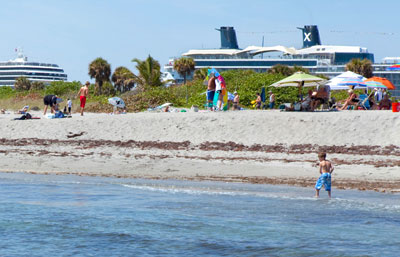
Sunbathing at the beach in John U. Lloyd Beach
State Park
The main attraction at this park is the beach – a
wonderful 2-mile (4-km) stretch of unspoiled sand that is evocative of
old Florida and perfect for swimming. Just inland is the 45-minute
Barrier Island Nature Trail through hammock forest, where squirrels and
raccoons sometimes scamper into the brush. Whiskey Creek, which divides
the park along its length, has lots of manatees, especially in winter,
and there is plenty of bird life to see in the mangroves. The whole
family will enjoy watching Port Everglades cruise ships coming and going
at the northern end of the park.
Kids’ Corner
You’ve Got Mail!
Back in the 1800s, mail was delivered by
carriers who traveled all the way from West Palm Beach to
Miami on foot! The beach at John U. Lloyd Beach State Park
was part of their 68-mile (109-km) route. They came to be
known as ‘barefoot mailmen’ because they used to walk
barefoot on the hard sand along the beach, as the salt water
would spoil their shoes.
Protect the turtles!
In summer, southern Florida’s beaches
become one of the largest loggerhead sea turtle nesting
grounds in the world. Nests full of turtle eggs are hidden
under the sand, so their location is marked with yellow tape
to warn people to stay away from them. Park guides at John
U. Lloyd Beach State Park lead walks to view nesting
loggerhead turtles on Wednesdays and Fridays in June and
July.
How many nests can you spot on the park’s
beach? Remember to keep your distance and never step on
them!
< The Gold and Treasure
Coasts
4. Seminole Indian Hard Rock Hotel and Casino
Florida’s Native Americans and a Hard Rock
Cafe
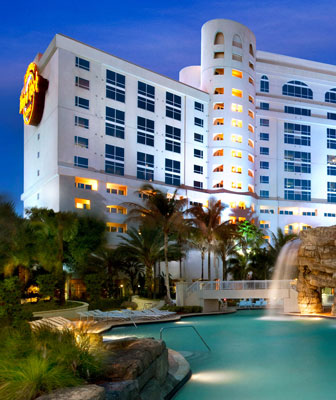
The tropical pool area in the Seminole Indian Hard
Rock Hotel and Casino
For a different perspective on Florida’s history and
culture, visit the Seminole Hard Rock Hotel and Casino near Hollywood.
In 1979, the Seminole became the first Native American tribe to develop
gaming as a form of income and in 2004 the tribe purchased the Hard Rock
Cafe franchise. Today, the millions earned as revenue from the complex
finance health care, education, full senior care, and modern community
centers.
Older kids may prefer the restaurants and shops in the
hotel complex. These include the Hard Rock
Cafe itself, the authentic Mexican standards (and guacamole
prepared tableside) at Tequila Ranch, and Wetzel’s Pretzels. Hip kids’
clothing store Brats and the Seminole Store are among the shops on site.
If there is time, take in one of the wide range of
concerts and shows at the Hard Rock Live, or enjoy a dip in the
lagoon-style pool.
Kids’ Corner
Rock ‘n’ roll
Every Hard Rock Cafe features rock and
roll memorabilia on its walls, such as guitars, costumes,
posters, photographs, and records of a myriad of artists,
from the Beatles and Elvis Presley to Michael Jackson and
Lady Gaga
< The Gold and Treasure
Coasts
5. Davie
Cowboys, children’s art and a trip to the
stars
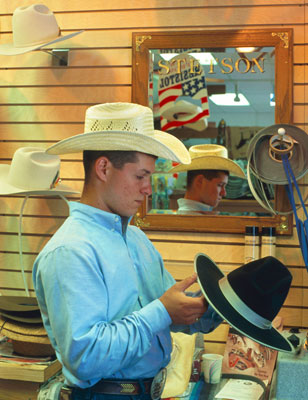
Browsing through a variety of cowboy hats at Grif’s
Western, Davie
Lying 20 miles (32 km) inland, this Fort Lauderdale
suburb is the unlikely venue for some intriguing family attractions.
Davie is more like a cowboy outpost than a typical Florida town, a
legacy of Florida’s early cattle-ranching settlers. Kids will love
watching the town rodeo, held intermittently between February and
November. There is even a rodeo for kids in June. Fans of the Wild West
should visit Grif’s Western, the leading
seller of cowboy boots, hats, and saddles in the state. Stop by the Old Davie School Historical Museum, a
restored 1918 schoolhouse, with exhibits that bring Florida’s pioneer
history to life. Younger children will get more out of the Young at Art Children’s Museum, which
explores the history of art through five child-friendly themes. Finally,
do not miss the Buehler Planetarium &
Observatory, where planetarium shows are followed by star-gazing
sessions. On a clear night, Jupiter, or even Saturn’s rings, might be
visible.
Kids’ Corner
Bucking broncos
The most famous event at a rodeo (and one
of the most dangerous) is called bronc riding, where cowboys
and cowgirls try to stay on a wild, bucking horse – or bull
– for as long as possible. Most get thrown off eventually.
Riders score points for how long they can hold on: they have
to stay on the horse for at least 8 seconds in order to
score – it’s much harder than it sounds!
Scavenger Hunt!
The Old Davie School Historical Museum is
crammed with all sorts of strange objects, old photographs,
and historic maps. Can you find these exhibits?
A stuffed alligator
The Pioneer Hut
The old water well pump
Viele House
An inkwell (Hint: look in
the old classroom)
< The Gold and Treasure
Coasts
6. Flamingo Gardens
The home of pink flamingos
This botanical garden, smothered with subtropical
plants and trees, is a serene preserve that attracts butterflies and
hummingbirds in winter. The gardens are set up with families in mind –
children are encouraged to touch and smell herbs and plants in the
Children's Garden. But, inevitably, most kids will be asking, “where are
the flamingos?” Fear not, the on-site Everglades Wildlife Sanctuary is
home to 83 species of Florida’s native birds and animals, including
alligators, panthers, bobcats, otters, eagles, and pink flamingos.
Around 250 birds, including plenty of noisy waders, can be seen inside
the huge Free-flight Aviary. For a change of pace, visit the Wray Home
Museum, restored to its appearance in the 1930s, when it was the home of
Floyd and Jane Wray, the founders of the gardens.
Kids’ Corner
Bird hunt
How many of these birds can you spot at
Flamingo Gardens?
Bald eagle
Peacock
Flamingo
Egret
White ibis
< The Gold and Treasure
Coasts
7. Butterfly World
Birds, butterflies, and bugs
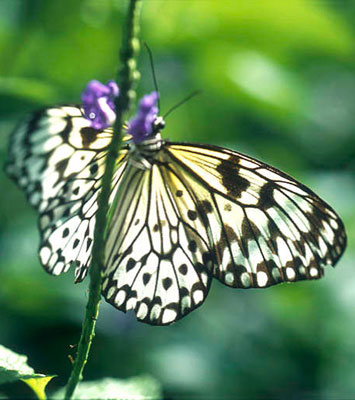
A butterfly on foliage in Butterfly World, Coconut
Creek
Few places are as enchanting as this nature park,
located in Tradewinds Park, where hundreds of brilliantly colored
butterflies flutter through tropical greenhouses, and exotic birds
nestle in the palms. Inside the Tropical Rain Forest Aviary, bright
blue, amber, and yellow butterflies land gently on children’s hands and
shoulders. Kids also love the Lorikeet Encounter, where multicolored
parrots feed from cups of nectar right out of visitors’ hands.
The Tinalandia Suspension Bridge, which sways as kids
romp across it, is another favorite, while the main attractions inside
the blossom-filled Jewels of the Sky Aviary are the fearless
hummingbirds, which feed on nectar in the flowers. Do not miss the Bug
Zoo, where giant water bugs, creepy spiders, and mean-looking wasps are
sure to elicit gasps of horror/pleasure.
Kids’ Corner
Butterflies vs moths
Butterflies fly during the day, unlike
moths that fly mostly at night. And most butterflies have
antennae that are clubbed at the end. The antennae of the
moth are pointed or feathered.
< The Gold and Treasure
Coasts
8. Boca Raton
A Mediterranean fantasy
This lovely city started to develop during the Florida
land boom of the 1920s, when famous architect Addison Mizner built the
ultra chic pink building called the Boca Raton Resort & Club. Kids
will probably spot this fortress from the car. Mizner inspired the
Mediterranean Revival style of architecture that still dominates
downtown and gives Boca Raton a Continental feel.
Younger kids will find the Boca
Raton Children’s Museum enticing. Set within a 1913 driftwood
Cracker cottage – the simple abode of early Florida farmers – it has
many handson exhibits that will keep children occupied for hours. The
KidsCents Bank exhibit shows how a bank works, with teller windows and a
working vault, while Pirate Island brings the seafaring world to life
with interactive games, stories, and a treasure map. Nearer to the
ocean, stroll around Gumbo Limbo Nature
Center, where boardwalks wind through a tropical hardwood
hammock and a mangrove forest. Spot ospreys, brown pelicans, and the
occasional manatee lurking in the warm waters.
Kids’ Corner
Mouse mouth
The name Boca Raton comes from Spanish
words. Boca means “mouth” and raton means
“mouse”. So when you visit Boca Raton, you are entering the
mouth of the mouse!
< The Gold and Treasure
Coasts
9. Delray Beach
Fun with water and sand
Delray Beach is one of the most popular,
family-friendly destinations in South Florida – this small and welcoming
beach town has even received awards for being the “Most Fun Small Town
in America.” The 2-mile (3-km) beach, with good facilities, is ideal for
fun activities, while the calm waters allow for numerous watersports,
from paddleboarding to snorkeling. The nearby Atlantic Avenue has plenty
of fine restaurants and bars, upscale shops, and art galleries.
When kids tire of the beach, take a stroll along the
three-quarter-mile (1-km) boardwalk that winds around the Wakodahatchee Wetlands. This swamp area has
become home to a variety of wildlife, including alligators, turtles,
frogs, and over 140 different species of birds. More water-related
activities can be found at the Sandoway Discovery
Center, which has reptiles, shark feedings, a shell collection,
and an exhibit on the Delray Wreck, a steamship that sunk off the coast
in 1903. The restored Cason Cottage Museum,
run by the Delray Beach Historical Society, takes you back to Florida’s
pre-boom era, from 1915 to 1935, with a focus on local architecture and
history.
Kids’ Corner
Shark Attack
Feeding sharks at the Sandoway Discovery
Center can be very exciting, but did you know…
Sharks have been around on
Earth in some form for nearly 450 million years!
Sharks are loners, they
don’t tend to live in groups.
Sharks never run out of
teeth. If they lose any, one from the back-up rows
behind it will move into that position. In this
way, sharks can use up to 30,000 teeth in their
lifetime!
The biggest fish ever
caught was a great white shark hooked off South
Australia in 1959. It weighed an amazing 2,664 lb
(1,208 kg) – as much as a small car!
< The Gold and Treasure
Coasts
10. Morikami Museum and Japanese Gardens
A day out in the Far East
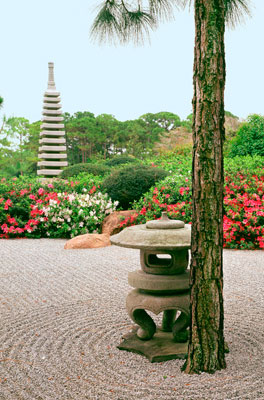
Stone sculptures and flower beds in the Japanese
Gardens, Delray Beach
Southern Florida is an unlikely place for an outpost
of classical Japan, but this museum and its beautifully landscaped
grounds give visitors an authentic taste of the Far East. See six
beautiful Japanese gardens, a Shinto shrine, a teahouse, and a museum –
the legacy of a Japanese agricultural colony established in Boca Raton
in the early 20th century.
The main section of the museum displays Japanese art,
but kids might find this hard-going; aim instead for the Yamato-kan
house, where the Japan through the Eyes of a Child exhibit offers a
taste of modern Japanese life specially designed for younger kids.
Explore a Japanese classroom, a shopping street, and a typical home
complete with tatami mats (straw mats used to cover floors), a
huge bathtub, and a hightech toilet. The gardens, with zigzag bridges,
hidden waterfalls, Zen-inspired rock gardens, and many bonsai trees, are
ideal for strolling.
Kids’ Corner
Cup of Tea?
The tea ceremony (sado) is an
important part of Japanese culture, and you can experience
this at the teahouse in the Morikami Museum and Japanese
Gardens, along with live demonstrations of koto (a
traditional stringed instrument) and kitsuke (the art
of wearing a kimono).
Learning Japanese
Try to learn these Japanese words:
Thank you:
Arigatoō
Yes: Hai
Hello:
Kon’nichiwa
Goodbye:
Sayoōnara
Awesome!:
Sugoi!
< The Gold and Treasure
Coasts
11. Palm Beach
Hang out with America’s mega-rich
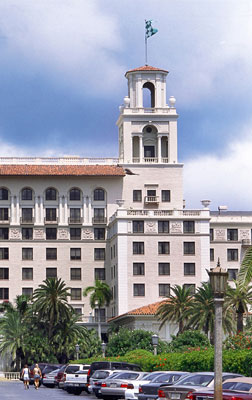
Impressive facade of The Breakers
One of the wealthiest places in the US, Palm Beach
is peppered with grand mansions, pristine gardens, and upscale
shopping streets. The town was founded in the 1890s, when Henry
Flagler brought his railroad south and built two luxury hotels here.
In the 1920s, Addison Mizner added Mediterranean-style homes and
plazas, lending the town a refined European air. Ever since, it has
attracted tycoons, sports stars, and even royalty.
Key Sights
1. Lake Trail Bike or walk along this
tree-shaded 3-mile (5-km) path that borders the waters of Lake
Worth to take in scenic lake views and admire Palm Beach
mansions.
2. Green’s Pharmacy Open since 1937,
this old-fashioned diner is known for its breakfasts, burgers,
and ice cream sodas. Hit the pharmacy section for all sorts of
beach gear, toys, and old-style sweets.
3. The Breakers Established by Henry
Flagler in 1896, this hotel is a spellbinding place to visit for
a guided tour. The present Italianate building dates from
1926.
4. Episcopal Church of
Bethesda-by-the-Sea This Neo-Gothic church was built in
1926. Stroll in its lush Cluett Memorial Garden, amid the
cloisters, with gazebos and a fountain pond filled with colorful
koi.
5. Society of the Four Arts While art
exhibitions are held inside this Italianate building, the
beautifully landscaped grounds contain a series of lush
botanical gardens, and a selection of elegant modern
sculptures.
6. Norton Museum of Art This museum
houses several masterpieces by great artists such as Picasso and
Gauguin, as well as modern American art by Jackson Pollock,
Georgia O’Keeffe, and glass artist Dale Chihuly.

Left Lush gardens at the Society
of the Four Arts Middle Norton Museum of Art
Right Green’s Pharmacy
Kids’ Corner
Sculpture hunt
Try to find these sculptures in the
Society of the Four Arts sculpture garden:
Monumental Apple
Basket (1998) by Leslie Ortiz
Giraffes (1959) by
Luis Montoya
Naja (1979) by
Diana Guest
Allies (1995) by
Lawrence Holofcener
Ghosts of Palm Beach
Palm Beach Town Hall is said to be haunted
by former mayor Paul Ilyinsky, who was related to the
Russian royal family. His ghost is said to hum the national
anthem of Imperial Russia!
Rags to riches
Tycoon and railroad builder Henry Flagler
built the original Breakers hotel in Palm Beach. Flagler got
his first job, at the age of 14, in a grain store: he was
paid just $5 a month plus room and board. When he died in
1913, he had earned a fortune of $60 million ($1.3 billion
in today’s money).
Dream a hotel
The Breakers hotel was designed to look
like a grand Italian palace, with two towers and a
fortress-like front. See if you can draw a bigger and
grander hotel than The Breakers, using at least four shapes:
rectangles, squares, triangles, circles, or any others.
< The Gold and Treasure
Coasts
12. Flagler Museum
A palace fit for a merchant prince
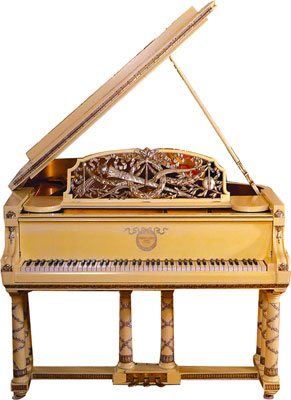
Grand piano in the Drawing Room
While traveling along the east coast of Florida,
it is impossible not to hear about Henry Flagler, the man who
probably did more to develop the state than any other. Before
Flagler’s East Coast Railway reached Miami in 1896, most of Florida
was a wilderness. By the time the trains made it to Key West in
1912, the region was firmly established as a winter getaway.
Flagler’s lavish Palm Beach home, Whitehall, is now the Flagler
Museum, a fascinating monument to the man and his legacy.
Key
Features
1. Flagler-Kenan History Room Learn
about Flagler’s achievements as a founding partner in Standard
Oil and as a developer of Florida’s east coast here. An 18-carat
gold replica of the telegram announcing the completion of his
Key West Railway is also on display.
2. The Grand Hall Seven types of
marble were used to create the largest and grandest room built
in America’s Gilded Age. It contains a bust of Caesar Augustus
and a portrait of Henry Flagler himself.
3. Drawing Room Flagler used delicate
aluminum leaf, coated with shellac, to highlight the plaster
ornaments in this gorgeous room.
5. Master Suite Henry Flagler and his
wife shared this, the most lavish bedroom in the house. The
furniture and gold color are in French Louis XIV style.
6. Music Room Flagler employed his own
organist to play a 1,249-pipe Odell organ in this room, a
favorite with Mrs. Flagler for holding parties.
• Henry Flagler's private
Railcar No. 91 The Flagler Kenan Pavilion has Flagler’s
very own “palace on wheels,” with a bedroom, a bathroom, guest
quarters, and a kitchen.
• West Room Part of
the 1925 hotel extension, this room originally served as the
dining room. Look out for the medieval crests that circle the
walls below the ceiling.

Left The West Room
Middle Flagler-Kenan History Room
Right Lavish Master Suite
Kids’ Corner
Do you know…
Visit the Flagler-Kenan History Room and
see if you can answer these questions:
When was Henry Flagler
born?
Which company made the
original gold telegram? (Hint: it’s a girl’s
name.)
Which town in Florida did
Flagler’s railway reach in 1912?
Flagler’s long-lost rail car
Henry Flagler’s private Railcar No. 91
wasn’t always at the Flagler Museum. In 1935 it was sold to
a railway in Georgia; 14 years later it was sold again. By
the time it was rediscovered in 1959 it was being used as a
dormitory for farm workers in Virginia! It took another nine
years to restore it at the museum.
Color it pretty
Did you visit the Yellow Roses Room?
Flowery wallpaper was popular in the early 1900s. Draw the
most colorful wallpaper pattern you can think of – try to
use at least three shapes and three colors.
Dream house
Flagler’s mansion had 75 rooms, including
22 bathrooms. If you could design a mansion or a palace, how
many rooms would you have? What kind of rooms would you
include? Draw a floor plan of your dream house. Be sure to
mark the front door on the plan.
< The Gold and Treasure
Coasts
13. Palm Beach Zoo
Pyramids, an interactive fountain, and wild
things
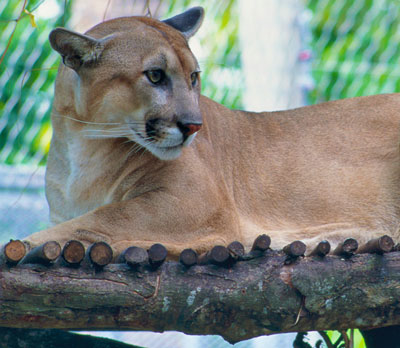
A rare Florida panther in Palm Beach Zoo, West Palm
Beach
This wildlife park has an intriguing array of themed
areas and plenty of showstopping animal attractions, including eagles,
panthers, black bears, otters, tigers, and alligators. Don’t miss the
stunning Harriet W. & George D. Cornell Tropics of the Americas
exhibit – a re-creation of the Central and South American rain forest,
where jaguars and giant anteaters pad around Mayan pyramids. The zoo,
with its naturalistic environments and friendly, informative staff, is
especially good for families. There are plenty of things to touch and
climb onto, and opportunities to feed pelicans. The daily Wild Things
Show features a rainbow boa, singing dogs, and a pygmy hedgehog named
Xena. Be sure to bring the kids’ bathing suits – they get to cool off in
the water jets at the Interactive Play Fountain. Kids also love taking
rides on the Wildlife Carousel and browsing the outdoor gift shop.
Kids’ Corner
Zoo tycoon
Plan your own zoo or safari park – draw a
map dividing all the animals into different areas, but make
sure to add in paths and walkways for the visitors!
< The Gold and Treasure
Coasts
14. Lion Country Safari
Journey to the African savanna
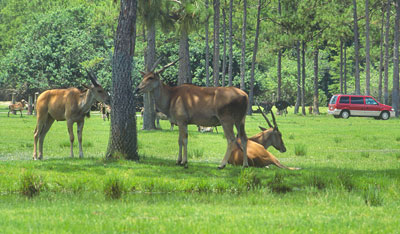
Antelopes resting in shade at Lion Country Safari,
Loxahatchee
A wildlife preserve, Lion Country Safari does a fine
job of re-creating the African plains, with elephants, giraffes,
chimpanzees, zebras, ostriches, and lions roaming free. This is a
drive-through safari park, with a 4-mile (6-km) road and 900 wild
animals, which means visitors are confined to their cars. In addition to
the African areas, there are sections dedicated to the South American
pampas and the Gir Forest in India.
The chimpanzees live on a five-island system: try to
spot Little Mama, who was born in Africa around 1938 and is the oldest
chimpanzee in captivity. She is thought to have been a performer in the
traveling entertainment show Ice Capades when she was young, and she
still likes to wear a shawl!
After the safari, families can stretch their legs at
Safari World. This is a theme park with interactive fountains, a Ferris
wheel, and a petting zoo, as well as camel rides and a giraffe-feeding
exhibit.
Kids’ Corner
What’s in a name?
A group of lions is called a pride, and
each pride can include up to 40 lions. There are a lot of
funny names for such groups – a romp of otters, an ambush of
tigers, a gaggle of geese, a mischief of mice, a school of
whales, a convocation of eagles, and even a murder of crows!
On safari
At the Lion Country Safari or Palm Beach
Zoo
How many animals did you
see starting with the letter “A”?
How many animals did you
see with two legs?
How many animals did you
see starting with the letter “L”?
How many reptiles did you
see?
< The Gold and Treasure
Coasts
15. Juno Beach: Loggerhead Marinelife Center
Saving turtles and feeding fish
The sands of Juno Beach, 13 miles (21 km) north of
West Palm Beach, make for a pleasant visit any time, but this small
seaside town is enhanced by the family-friendly Loggerhead Marinelife
Center. The focus here is the Sea Turtle Hospital, where sick and
injured turtles are cared for. See feeding, medication being given, and
even physical therapy sessions, depending on the time of day.
The center’s exhibit hall chronicles turtle life cycles
and Florida’s coastal ecosystems. There are also five small aquariums
with fish, corals, and anemones. Catch the 30-minute Dr. Logger show,
which reveals the life of a sea turtle, highlighting not just its diet
and habits, but the threats it faces in an interactive way that engages
kids of all ages. At Hatchling Tales, younger kids are entertained with
ocean-inspired stories and crafts, and there is also a weekly
marine-related Kids’ Story Time. In June and July, there are turtle
walks in the evening – expeditions to watch the turtles as they crawl
ashore to lay eggs under cover of darkness. Reservations for this are
essential, and accepted from May onward.
Kids’ Corner
Magic turtles
How many turtles have you seen so far in
Florida? Write a short story about a magic sea turtle. What
magical powers does it have? Can it change color, fly, talk,
travel in time, make spells, or become invisible?
< The Gold and Treasure
Coasts
16. Vero Beach
Let’s hunt for treasure!
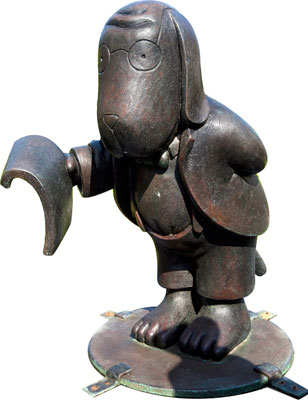
Trial Scene by Tom Otterness, Vero Beach
Museum of Art
North of Palm Beach, the cities, resorts, and
grand mansions give way to the less developed Treasure Coast, which
boasts waters where manatees can be spotted, great sweeps of sandy
beaches, and seaside towns such as Vero Beach. Much of the area’s
appeal lies in its state parks and sandy barrier islands, but there
are plenty of museums and wildlife-related activities to keep
families busy.
Key Sights
1. Sebastian Inlet State Park The wild
and enchanting beaches here lure plenty of surfers and swimmers,
and the McLarty Treasure Museum provides a cultural
diversion.
2. Mel Fisher’s Treasure Museum
Dedicated to Mel Fisher, a modern treasure hunter, this museum
displays Spanish booty dredged up from the 1715 fleet wrecked
just offshore.
3. Environmental Learning Center Learn
about the mangroves and wetlands of the Indian River Lagoon
here, with hands-on exhibits, boat tours, and touch tanks full
of local sea life.
4. Riverside Children’s Theatre Watch
plays and musicals performed by kids for kids here – from Roald
Dahl’s The Twits, to The Wiz, and a jazz version
of The Nutcracker.
5. Driftwood Resort This
bizarre-looking hotel – a giant beach shack right on the water –
is worth a visit even for non-guests. The entire edifice was
built in 1935 from ocean-washed timbers and planks.
6. Vero Beach Museum of Art See modern
art in a variety of media, from the stunning glasswork of Dale
Chihuly to the horse sculptures of Deborah Butterfield.
7. Indian River Citrus Museum Citrus
farming has been an important part of life in Florida since the
1860s, and this museum chronicles the struggles and successes of
the early pioneers.
8. McKee Botanical Garden This lush,
blossom-smothered garden features an extensive subtropical
jungle laced with streams, ponds, and trails dating back to the
1920s.

Left Indian River Citrus Museum
Middle Manatee sculpture at the
Environmental Learning Center Right The
blossom-smothered McKee Botanical Garden
Kids’ Corner
Tables, trees, and Tikis
You might think that the McKee Botanical
Garden is just full of plants and trees, but if you look
hard enough you might find some special things:
Somewhere in the garden is
a wooden table – not just any table, but the
biggest mahogany table in the world!
A Tiki is a large
Polynesian carving of a scary face usually made on
Pacific islands. But there is one here guarding a
secret seating area: can you find it?
There is a strange-looking
tree called “the dragon tree.” Can you see why it
is called that?
The pineapples you can eat
look green and yellow. You can see tiny pink
pineapples in the gardens. Don’t try to pick them!
Treasure quest
Take a sketchbook and draw your own
treasure island map. Add scary names such as Blood Valley,
Skull Cave, and Terror River. Make sure you mark the
treasure with a special symbol, and draw arrows to show how
to find it.
What lies beneath
The Spanish treasure fleet of 1715,
sailing from Cuba to Spain, was made up of 12 galleons
loaded with silverware, and lots of gold. As the fleet
sailed past Florida, it was hit by a fierce hurricane that
wrecked 11 of the ships. Over 1,000 sailors were drowned,
and many more died of starvation. Much of the treasure was
never recovered – experts think that treasure worth $550
million remains hidden on the seabed.
< The Gold and Treasure
Coasts
17. Fort Pierce
On top of the lagoon, and deep beneath the
sea
Much of Fort Pierce is industrial, but there are a few
attractions on the outskirts. The Manatee
Observation & Education Center, overlooking the Indian River
Lagoon, is the favored grazing spot of the local manatee population. The
best time to see them is from mid-November to early April. Dolphins and
pelicans are also regular visitors. The center houses a butterfly garden
and hands-on exhibits that provide information about manatees,
butterflies, their habitats, and more.
Just 5 miles (8 km) north of Fort Pierce, the Harbor
Branch Oceanographic Institute is a well-equipped deep-sea research
center belonging to Florida Atlantic University. Visit the Ocean Discovery Center to learn about the
incredible work done in the underwater labs–developing food aquaculture
and deep-ocean exploration. The interactive exhibits are educational,
but still fun for kids 7 plus. There is also a small aquarium for little
ones.
Kids’ Corner
Snacks from the sea
Which one of these sea creatures is not
eaten by humans?
(a) Clams
(b) Seaweed
(c) Coral
(d) Crab
(e) Shrimp
Manatee or mermaid?
Did you see any manatees at the Manatee
Observation Center? Hundreds of years ago sailors believed
that manatees were actually mermaids – half woman, half
fish!
< The Gold and Treasure
Coasts
18. Hutchinson Island
Bathtubs on the beach
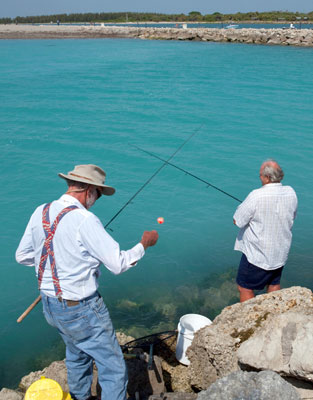
Fishing along the shore of Hutchinson Island
This island is a slim, 20-mile (32-km) stretch of
mangroves, scrub, and idyllic sandy beaches. It has only one road,
Highway-A1A, which runs from north to south. The best attractions lie at
the southern end of the island, across from the town of Stuart. Bathtub Reef Park is a popular destination
for families. At low tide, a series of exposed reefs just offshore
create a protected, bathtub-like swimming area ideal for kids. A short
drive north, the Elliott Museum, in
eco-friendly premises, charts the history of the area with interactive
exhibits and hands-on learning experiences. The museum also has a
collection of over 50 vintage cars.
The Florida Oceanographic Coastal
Center across the street from the museum, takes a practical
approach to learning about Florida’s marine life, offering a stingray
touch tank, a huge game-fish lagoon, and a looping nature trail to the
Indian River Lagoon.
Kids’ Corner
Sketch a stingray
At the Florida Oceanographic Coastal
Center you can actually feed three types of stingray:
Atlantic, Cownose, and Southern. They all look a bit
different – try to sketch all three kinds of stingray.
Find a fish
How many fish can you see in the fish tank
of Florida Oceanographic Coastal Center? See if you can spot
these sea creatures:
Upside-down jellyfish
Queen angelfish
Porkfish
Cocoa damselfish
Octopus
< The Gold and Treasure
Coasts
19. Jupiter Island
Turtle walks and blowing rocks
A long, thin strip of pine, sand, and scrub, Jupiter
Island is 17 miles (27 km) of affluent homes and wonderfully pristine
beaches. The only north–south thoroughfare on the island is Beach Road,
but with the sea blocked from view most of the way, it is not especially
scenic, so plan to make several stops.
The northern end of the island is protected within Hobe Sound National Wildlife Refuge, a major
nesting site for sea turtles and best experienced on an organized turtle
walk. At other times, stroll up the 2-mile (4-km) beach trail to Peck
Lake, looking out for scrub jays, gopher tortoises, and tiny snakes. The
refuge’s small nature center, on US-1, has a few exhibits, including
tanks with baby alligators, and there is a short nature trail that leads
down to the shores of the Indian River Lagoon.
Toward the southern end of the island, Blowing Rocks Preserve contains a rare
limestone outcrop that covers much of the beach – it is fun to watch the
waves driving under the rocks and spraying out at the top. The Hawley
Education Center across the road has displays on Jupiter Island habitats
and more trails into the thick mangroves on the lagoon.
